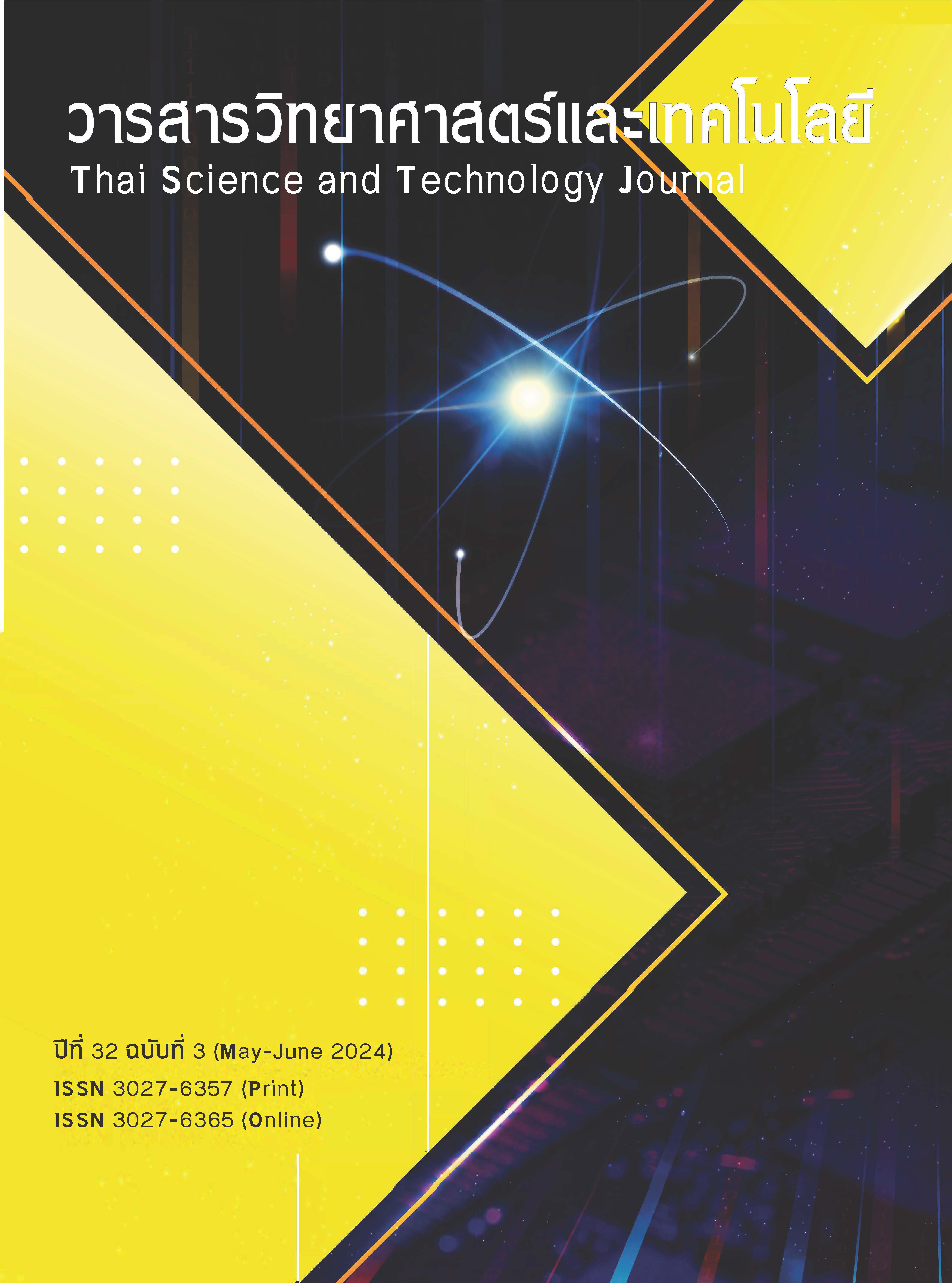Seed Priming with KNO3 Solutions on Seed Quality of Asiatic Pennywort
Main Article Content
Abstract
Seed dormancy of Asiatic pennywort is caused by germination inhibitors in the embryo or food storage inside the seed at the physiological maturity stage, resulting in poor, slow and non-uniform germination. Therefore, this research aimed to study the effects of seed priming with KNO3 solutions on the seed quality of Asiatic pennywort to enhance seed germination. The experiment was designed in a completely randomized design comprising six treatments, including non-primed seeds (control), and seed primed by soaking in 0% (reverse osmosis water), 0.5, 1, 2 and 3% KNO3 solutions for 24 hours. Seeds were then dried to reduce the moisture content to the initial level (7%). The results showed that seed priming of Asiatic pennywort with all treatments had no effect on the percentages of radicle emergence and germination compared to non-primed seeds. However, it did reduce the days to emergence (DTE) and mean germination time (MGT) compared to the control. Therefore, seed priming of Asiatic pennywort with 1% KNO3 for 24 hours was the best method, resulting in higher germination rate, and faster DTE and MGT compared to non-primed seeds.
Article Details
References
Peiris, K.H.S. and Kays, S.J., 1996, Asiatic pennywort [Centella asiatica (L.) Urb.]: a little-known vegetable crop: reviews, HortTechnology, 6: 13-18.
The Agricultural Research Development Agency, 2017, Centella asiatica Research Database, Available Source: http://agknowledge.arda.or.th/centellaasiatica/?page_id=861, November 25, 2023. (in Thai)
Supcharoen, P., 1999, Herbs and Thai Culture, Part 2, Trees along the Fence, The War Veterans Organization of Thailand Under Royal Patronage of His Majesty the King Press, Bangkok, 231 p. (in Thai)
Thongekkaew, J., 2013, Centella asiatica (Linn.) urban: a very useful herb, J. Sci. Technol., Ubon Ratchathani, 15(3): 70-75. (in Thai)
Department for Development of Thai Traditional and Alternative Medicine, 2016, National Master Plan for the Development of Thai Herbs, No. 1, 2017-2021, Ministry of Public Health, Nonthaburi, 200 p. (in Thai)
Preedakorn, P., Sitthilert, T. and Rujirayanyong, S., 2021, Research strategies for Gotu Kola, UTCC J. 41(3): 1-21. (in Thai)
Ekpong, B. and Wiyachai, T., 2006, High Quality of Asiatic Pennyworth (Centella asiatica (L.) Urb.) Seed Production for Farmer in Ban Wang Yang. Warinchamrap District, Ubon Ratchathani Province, Research Report, 33 p. (in Thai)
Devkota, A. and Jha, P.K., 2010, Seed germination responses of the medicinal herb Centella asiatica, Brazilian J. Plant Physiol. 22: 143-150.
Finch-Savage, W.E. and Leubner-Metzger, G., 2006, Seed dormancy and the control of germination, New Phytol. 171(3): 501-523.
Bewley, J.D., Bradford, K., Hilhorst, H. and Nonogaki, H., 2013, Seed: Physiology of Development, Germination and Dormancy, 3rd Ed., Springer, New York, 392 p.
ISTA, 2023, International Rules for Seed Testing. International Seed Testing Association (ISTA), Wallisellen, Switzerland, 308 p.
McDonald, M.B., 2000, Seed Technology and Its Biological Basis. Sheffield Academic Press, England, 419 p.
Hasanuzzaman, M. and Fotopoulos, V., 2019, Priming and Pretreatment of Seeds and Seedlings: Implication in Plant Stress Tolerance and Enhancing Productivity in Crop. Springer Nature Singapore Pte Ltd., Gateway East, Singapore, 415 p.
Na nakorn, P. and Kaewsorn, P., 2021. Effects of KNO3 concentration and aeration during seed priming on seed quality of wax gourd (Benincasa hispida [Thunb.] Cogn.). Agric. Nat. Res. 55: 877-885.
Chanprasert, W., 2010, Seed Physiology, Department of Agronomy, Faculty of Agriculture, Kasetsart University, Bangkok, 163 p. (in Thai)
Thongnuson, N. 2022, Effects of Seed Priming with KNO3 and GA3 Solutions on Seed Quality of Asiatic Pennyworth (Centella asiatica (L.) Urb.), Special Problem, Kasetsart University, Bangkok, 18 p. (in Thai)
Sowjanya, S. and Dutta, A., 2020, Influence of seed priming through KNO3 on plant growth and seed production of coriander (Coriandrum sativum L.). Int. J. Curr. Microbiol. Appl. Sci. 9: 722-728.
Sukasem, K., Chulaka P. and Kaewsorn, P., 2020, Effects of concentration of KNO3 solution and soaking duration during seed priming on germination and vigor of dill (Anethum graveolens L.) seeds, King Mongkut’s Agr. J. 38(3): 280-287. (in Thai)
Dhillon, N.P.S., 1995, Seed priming of male sterile muskmelon (Cucumis melo L.) for low temperature germination, Seed Sci. Technol. 23: 881-884.
Coolbear, P., Francis, A. and Grierson, D., 1984, The effect of low temperature pre-sowing treatment on the germination performance and membrane integrity of artificially aged tomato seeds, J. Exp. Bot. 35: 1609-1617.
Ellis, R.H. and Roberts, E.H., 1980, Improved equations for the prediction of seed longevity, Ann. Bot. 45: 13-30.
Ekpong, B. and Wiyachai, T., 2008, Influences of seed maturity and overcoming methods on seed germination of Asiatic Pennyworth (Centella asiatica (L.) Urb.), Agric. Sci. J. 39(3) (special): 201-204. (in Thai)
Copeland, L.O. and McDonald, M.B., 2001, Principles of Seed Science and Technology, 4th Ed., Springer New York, 467 p.
McIntyre, G.I., Cessna, A.J. and Hsiao, A.I., 1996, Seed dormancy in Avena fatua: interacting effects of nitrate, water and seed coat injury, Physiol. Plant. 97: 291-302.
Lara, T.S., Lira, J.M.S., Rodrigues, A.C., Rakocevic, M. and Alvarenga, A.A., 2014, Potassium nitrate priming affects the activity of nitrate reductase and antioxidant enzymes in tomato germination, J. Agric. Sci. 6(2): 72-80.
Hilton, J.R. and Thomas, J., 1986, Regulation of pregerminative rates of respiration in seeds of various weed species by potassium nitrate, J. Exp. Bot. 37(10): 1516-1524.


